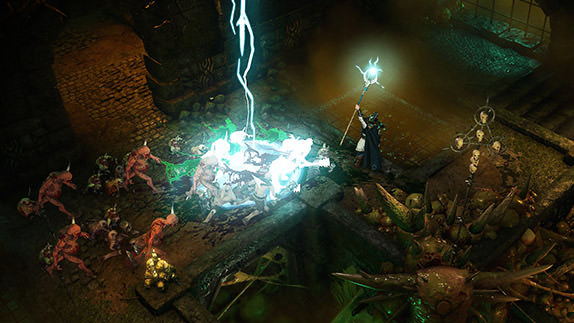Sherlock Holmes: The Devil's Daughter Review

 By Kevin Mitchell | Posted: July 18, 2016
By Kevin Mitchell | Posted: July 18, 2016
Developer Frogwares returns to 221B Baker Street for the eleventh game in the adventurous Sherlock Holmes series in The Devil's Daughter. In an attempt to keep the series feeling fresh, Frogwares implemented design changes that see a younger Sherlock Holmes (and Dr. Watson) focus more on action-oriented sequences than in previous iterations. It's clear that his appearance and overall demeanor is modeled more closely after Robert Downey Jr.'s take on the classic character with a touch of Benedict Cumberbatch's crassness.
In 2014's entry, Crimes & Punishments, the series moved toward including multiple self-contained cases, instead of dragging one overarching case across the entire game. It's the perfect format for the series, as each case doesn't overstay its welcome. The same can't be said about the newly intended action scenes. Although you can choose to skip the majority of them, some don't adequately explain what is needed from the player. In one sequence, Sherlock is attempting to run through a forest while rifle shots whiz by his ears. It isn't easily distinguishable where the shots are coming from or where you are meant to go. After a few quick deaths, I picked up on what the game wanted me to do, but without any button prompt to establish you are ready, you are left reading instructions while the game kills you without mercy. There is also a poorly constructed brawl sequence full of quick-time events that truly tested my nerves. It's nothing more than trial and error, and picking the wrong option forces you to restart from the beginning of the scene.
Even with its faults, I found the action refreshing, breaking up the traditional Sherlock Holmes formula of searching crime scenes for clues and using his keen eyes and deductive reasoning skills to get a better "read" of possible suspects and key witnesses. Between cases, players are treated to interactions between Sherlock's new neighbor Alice and her relationship with Sherlock's adopted daughter. There isn't any mystery about how the daughter came into his care, but I was intrigued by how Sherlock attempts to balance doing what he does best while striving to become a better father figure to young Kate. At the same time, his daughter was one of the worst new characters introduced, as I found myself rolling my eyes every time she said something cliché (which is all the time) about Sherlock doing nothing right. It's the typical teenage angst that boiled my blood, and I eagerly awaited the next case to begin so I no longer had to interact with her.
The five different cases are well done, each feeling diverse enough and covering more than simple murder mysteries. The Devil's Daughter heavily features Sherlock's ability to use his imagination to understand how events transpired (according to him) and in what order. You'll visit some new locations, as well as those already well-established in the series, such as Scotland Yard and Whitechapel. For the first time in the series, you can walk out your front door and explore the streets of London, but there honestly isn't much to do. Sure, you can now walk up to the newspaper boy and your longtime friend Wiggins, the leader of the street urchins who assist Sherlock. In fact, you'll be controlling Wiggins in the first case, tailing a possible suspect in the streets of Whitechapel through a soot-encrusted chimney and across rooftops. Playing dress-up is more heavily focused in this game, as you try to disguise your appearance in almost all of the game's cases. The most humorous being when I disguised myself as a priest to gain access to a very religious old lady's home to chase a demon that was haunting her residence. Sherlock Holmes, exorcist, has a nice ring to it.
As in the previous few games, you'll still use Sherlock's perception skills to profile characters. However, The Devil's Daughter includes more player interaction. Once profiled, characters are added to your journal, but this time, you can get an improper character profile if you aren't careful. Are those scars from abusive parents, or maybe the shifty-eyed character has taken part in a gang war? Was a boy just recently crying, or does he have a disease that made his eyes red? Get anything wrong and you'll miss out on unlocking a clue that will be used in subsequent lines of questions. I've improperly profiled a handful of characters (we all make mistakes), but I still ended up with all the clues in each case, so it is still possible to come to the conclusion you're looking for.
Cases are open to interpretation, as you collect clues to formulate your deductions inside Sherlock's mind. You'll still be connecting neurons by linking different clues together. In the middle of a case, you may have to process these clues to figure out how to proceed. Can you complete cases by condemning an innocent man to the gallows? Yes. You are given the option to replay the ending if you want to alter the conclusions based on the notes you've found throughout the case. Being connected online will show you the percentage of players that have come to the same conclusion, as well as whether you missed any clues.
Simply Put
With varying action sequences, Sherlock Holmes: The Devil's Daughter attempts to broaden the series' appeal. Almost every case features new mechanics that you'll only use once before moving on, but thankfully these can be skipped if you desire. I've skipped a couple in my playthrough and never felt like I was taking the easy way out. Why waste time on a poorly constructed trial-and-error sequence when I just want to figure out who set the streets of London ablaze in a hailstorm of fire? When it comes down to it, The Devil's Daughter is still a fun experience, giving players the freedom to come to their own conclusions. It's a great way to feel like you are a detective.
Note: Sherlock Holmes: The Devil's Daughter was reviewed on PC. A digital copy of the game was purchased by SelectButton.




